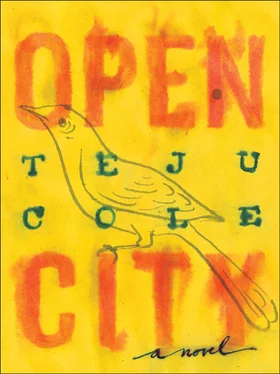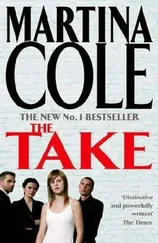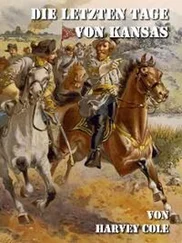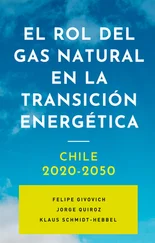Farouq’s face — all of a sudden, it seemed, but I must have been subconsciously working on the problem — resolved itself, and I saw a startling resemblance: he was the very image of Robert De Niro, specifically in De Niro’s role as the young Vito Corleone in The Godfather II . The straight, thin, black eyebrows, the rubbery expression, the smile that seemed a mask for skepticism or shyness, and the lean handsomeness, too. A famous Italian-American actor thirty years ago and an unknown Moroccan political philosopher in the present, but it was the same face. What a marvel that life repeated itself in these trivial ways, and it was something I noticed only because he hadn’t shaved for a day or two, and had a shadow on his jaw and around his mouth. But once I saw it, it was impossible not to be incessantly drawn into the comparison, or be distracted by it, a meaningless visual counterpoint to whatever else was going on as we talked and drank.
What was the meaning of De Niro’s smile? He, De Niro, smiled, but one had no idea what he was smiling about. Perhaps this is why, when I first met Farouq, I had been taken aback. I had subconsciously overinterpreted his smile, connecting his face to another’s, reading it as a face to be liked but feared. I had read his face as that of the young De Niro, as a charming psychopath, for this most trivial of reasons. And it was this face, not as inscrutable as I had once feared, that spoke now: For us, America is a version of Al-Qaeda. The statement was so general as to be without meaning. It had no power, and he said it without conviction. I did not need to contest it, and Khalil added nothing to it. “America is a version of Al-Qaeda.” It floated up with the smoke, and died. It might have meant more, weeks back, when the one speaking was still an unknown quantity. Now he had overplayed his hand, and I sensed a shift in the argument, a shift in my favor.
And so, he changed tack. When we were young, he said, or I should say, when I was young, Europe was a dream. Not just a dream, it was the dream: it represented the freedom of thought. We wanted to come here, and exercise our minds in this free space. When I was doing my undergraduate degree in Rabat, I dreamed of Europe; we all did, my friends and I. Not America, about which we already had bad feelings, but Europe. But I have been disappointed. Europe only looks free. The dream was an apparition.
It’s true, Khalil said, Europe is not free. The rhetoric claims freedom, but only the rhetoric. If you say anything about Israel, you have your mouth plugged with the six million. You’re not denying it, I said, quickly, you’re not actually questioning the figure, are you? That’s not the point, Khalil said, the point is that it is against the law to deny it, and that it is also against an unwritten law to even bring it up in discussion. Farouq assented. If we try to speak to the Palestinian situation, we hear six million. The six million: it was a terrible tragedy, of course, six million, two million, one human being, it’s never good. But what does this have to do with Palestinians? Is this Europe’s idea of freedom?
He had not raised his voice, but the intensity of his words was palpable. Did the Palestinians build the concentration camps? he said. And what about the Armenians: do their deaths mean less because they are not Jews? What is the magic number for them? I’ll tell you why the six million matter so much: it is because Jews are the chosen people. Forget the Cambodians, forget the American blacks, this is unique suffering. But I reject this idea. It is not a unique suffering. What about the twenty million under Stalin? It isn’t better if you are killed for ideological reasons. Death is death, so, I’m sorry, the six million are not special. I am always frustrated that this number, this sacred number that cannot be discussed is used, like Khalil said, to put an end to all discussions. The Jews use it to silence the world. I really don’t give a damn about the exact figure. All death is suffering. Others have suffered, too, and that is history: suffering.
Paulina came to clear the plates away, and we ordered another round of drinks. I asked Farouq if he cooked much for himself, or if he ate out. Neither, he said. The smoking kills my appetite, so I don’t eat much. He smiled his De Niro smile and steered the conversation back. Have you read a man called Norman Finkelstein? I shook my head. Look him up if you have the chance; he is Jewish, but he has written a strong study of the Holocaust industry. And he knows what he is saying, because his own parents survived Auschwitz. He is not anti-Jewish, but he is against the profit making, and the exploitation that the Holocaust is used for. Do you want me to write the name down? You’ll remember, you’re sure? All right, read him, and tell me what you think.
A cellphone rang; it was Khalil’s. He answered it, and spoke rapidly in Arabic. When he hung up, he said he had to leave. He and Farouq exchanged some words in Arabic, the first time they had done so in my presence. After he had gone, Farouq said, This is a good guy, you know. I can really say he is my best friend. He actually owns the phone shop, this one across the street, and several others in the city. So, he’s my boss. But he doesn’t believe in being boss, or acting like the boss. We are from the same town, Tétouan. He is so generous, you know; in fact, just now, as he was leaving, he went to the counter, and he just paid for everything, our drinks, your food. He’s like that, he gives and doesn’t think twice about it.
What I think is this, Farouq said, that Germany should be responsible for Israel. If anyone should bear the burden, it should be them, not the Palestinians. The Jews came to Palestine. Why? Because they lived there two thousand years ago? Let me give you an example of what that is like. Khalil and I, we are Moroccans, we are the Moors. We used to rule Spain. Now how would it be if we invade the Spanish peninsula and say, Our forefathers used to rule here in the Middle Ages, so it is our land: Spain, Portugal, all of it. It makes no sense, does it? But Jews are a special case. Don’t get me wrong, I am not personally against Jews. There are many Jews in Morocco, even today, and they are welcomed as part of the community. They look just like us, though, of course, they do better in business. I think sometimes that maybe I should become a Jew, just for professional reasons. I’ll be able to get everything done. What I am against is Zionism, and this religious claim they make on a land where someone else is already living.
I wanted to tell him that, in the States, we were particularly wary of strong criticism of Israel because it could become anti-Semitic. But I didn’t, because I knew that my own fear of anti-Semitism, like my fear of racism, had through long practice become prerational. What I would impose on him would not be an argument, it would be a request that he adopt my reflexes, or the pieties of a society different from the one in which he grew up, or the one in which he now functioned. It would do little good to describe for him the subtle shades of meaning evoked in an American ear by saying “Jews” instead of “Jewish people.” I wanted also to take him to task for attacking a religious ideal when his own central ideal was religious, but the skein of argument was beginning to feel like futility piled on futility; it was better to save my breath. So, instead, I asked him to tell me about his family in Tétouan, and what life was like growing up there. The café had by this time become quieter, and the cardplayers had gone home. Even the rain seemed to have wound down for the night. A few customers remained, like us, drinking, talking. When Paulina came to our table again, she asked if I wanted more of the same, but I thanked her and said I had had enough. Farouq ordered another bottle for himself.
Читать дальше












